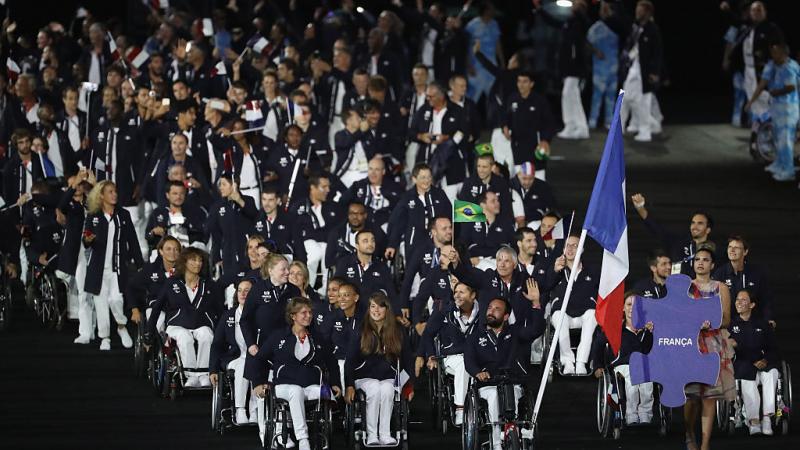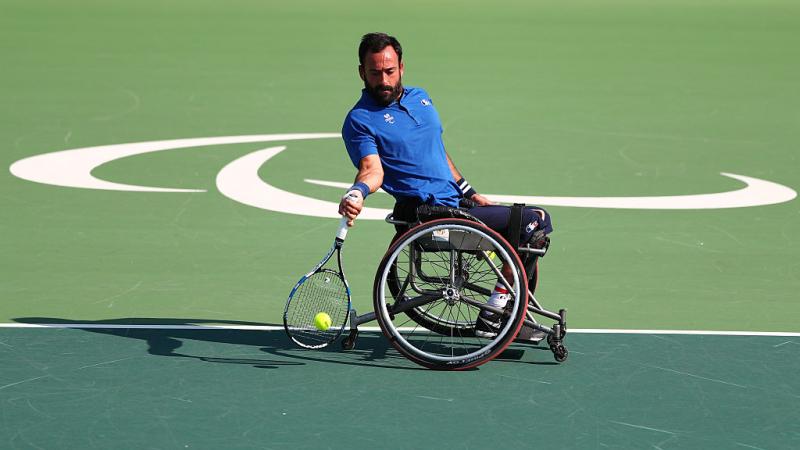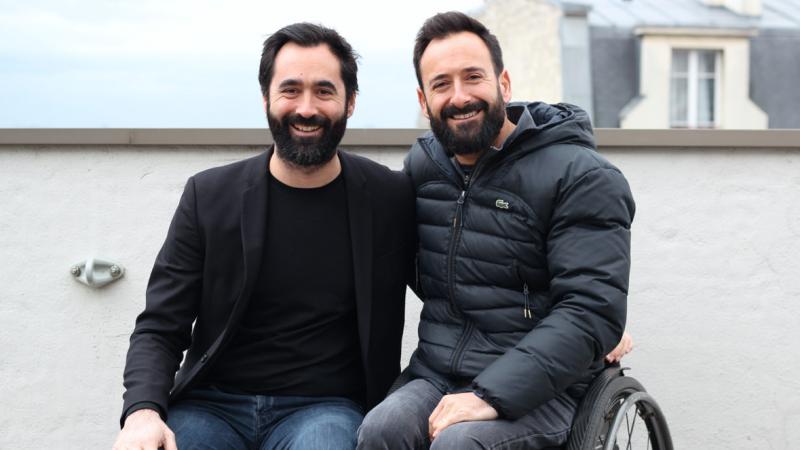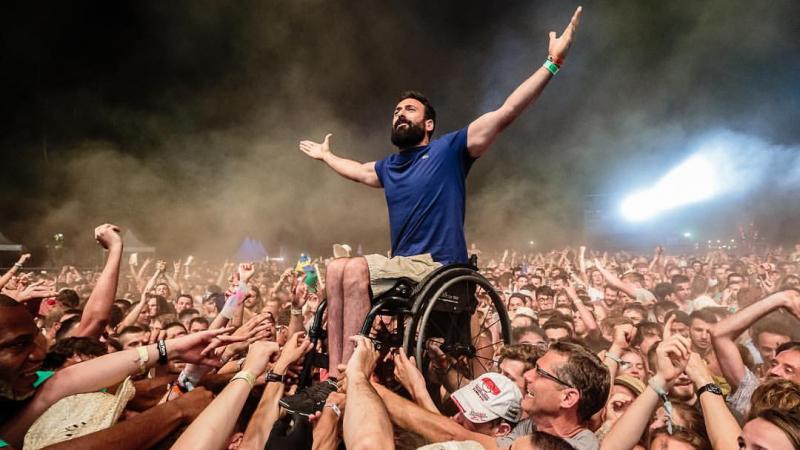Jeremiasz serves up intimate talk on sex and disability in groundbreaking podcast
No topics are off limits for Paralympic champion and Paris 2024 Ambassador Michael Jeremiasz who is eager to encourage people with disabilities to be open about their sexuality 14 Feb 2023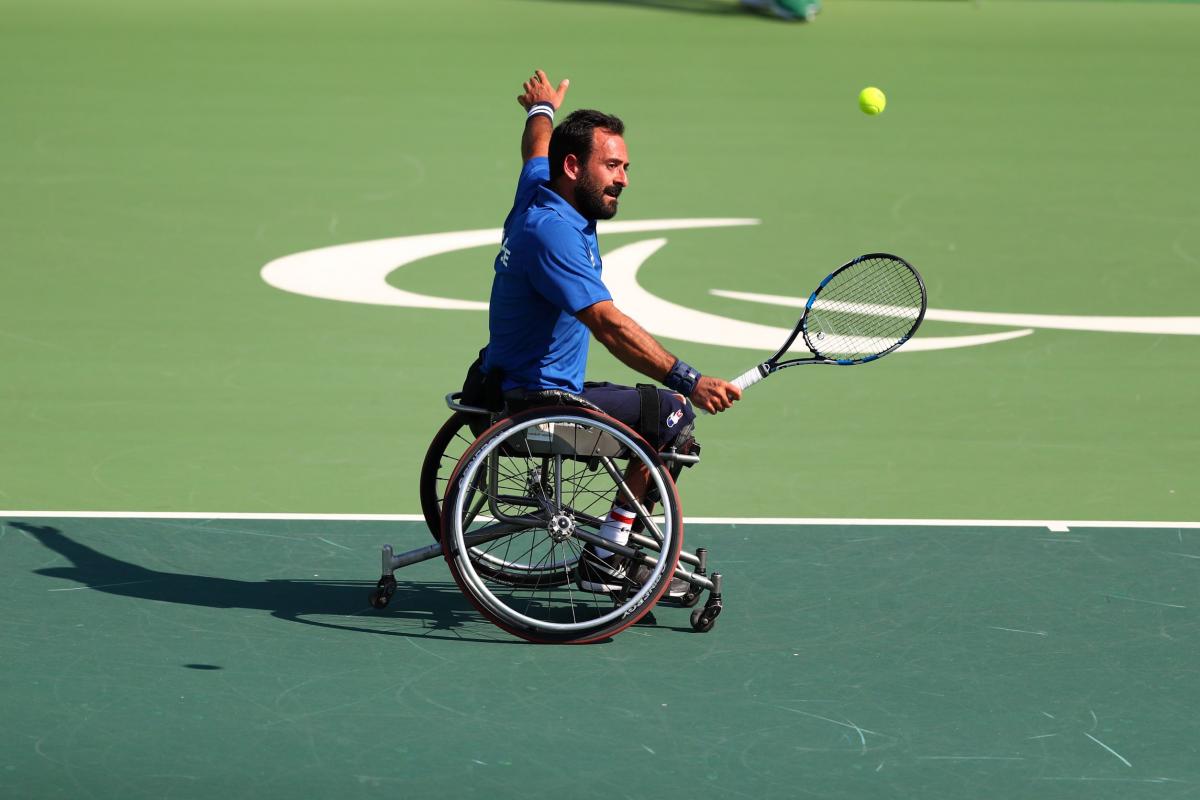
Put your headphones on or, if you’re feeling bold, turn on the speakers.
Michael Jeremiasz has something to tell you.
The Paralympic wheelchair tennis champion, who retired seven years ago, launched a podcast in September 2021. That alone would have been worthy of a mention coming from one of the most successful athletes in the sport, but his topic of choice made it even more so.
“It’s one of the last taboos, the sexuality of disabled people. That’s one of the very last taboos,” the French athlete said of “Dis-moi oui, Handi”, a podcast about sexuality among people with and without disabilities.
“We’re not very confident talking about sexuality and especially our sexuality, sexuality in general. That’s something I’ve always been talking about after my accident. It’s been a key thing in my young life after my accident, to build myself, to believe that I could still have a sexuality, to please and be pleased and still have desires.”
Available on the web-only So good Radio, “Dis-moi oui, Handi” wrapped up its second season in late November and now has a total of 15 episodes.
When it comes to the subject matter, no topic is off limits for the podcast host and his guests. Past discussions have touched on flirting, sexual fantasies, IVF treatments, one-night stands, the sexuality of high-level athletes and elderly people, among other themes.
“Talking about sexuality is about showing that it can be possible when you’re disabled. I’d like to inspire those teenagers who are so scared about how it’s going to be,” Jeremiasz said. “That was one of my biggest fears when I had my accident. Is the girl still going to look at me, could the girl be attracted by someone disabled? I accepted much faster not being able to walk, but I was far from accepting that I couldn’t have a life that I decided to have as a teenager.
“Luckily everything went fine, but it was something I needed to discover because I had no role model, and no one used to talk about that. With this podcast, it’s an interesting way to confront able and disabled experiences about different topics and then to share them to reassure people who are concerned that nothing is wrong about what they feel, about what they do.”
A self-mapped road
The discussions featured in “Dis-moi oui, Handi” offer the kind of information Jeremiasz himself was missing when he became paraplegic in 2000 as a result of a ski accident.
Then 19 years old, Jeremiasz started to explore the topic of sexuality while still at the rehabilitation centre, talking with nurses and other patients with disabilities. The responses he received, however, were unsatisfyingly narrow.
“There was just a medical approach about whatever you feel, the way the body worked, but that’s not the main question. The main question is society itself. How would you encourage someone just recently disabled to go in a club?” Jeremiasz said.
“How tough is it when you’re able to suddenly go out of your comfort zone and talk to someone, taking the risk that the person is not interested, but imagine if you add that to the fact that you’re disabled and you’re always scared that the person (says no) not because she doesn’t like the way you look, but because you’re disabled.”
Jeremiasz has since collected fuller answers to these questions, and he is eager to share them to help others avoid the self-doubt he faced as a young man.
Let's get personal
If it helps get the point across, Jeremiasz does not shy away from revealing his own intimate experiences on the podcast.
The four-time Paralympian and four-time Paralympic medallist describes himself as having “quite an intense sexuality when I was single” and openly shares those stories with his listeners.
“Everything I say there, I’m neither ashamed or proud of, it’s just the life I had and the life I enjoyed having,” Jeremiasz explained. “But that was the key, that’s what we decided. I’m asking people to come to the show and to say what they think about a subject and to tell very intimate and private things so for every subject I start with two minutes of giving a personal story regarding the subject.
“Of course, I need to have a connection with it. I’m not going to invent something. If tomorrow I think we might do something about BDSM, which is about bandage and sadomasochist sexuality, I have nothing to tell from a personal point of view. I have never experienced things like that and I’m not that keen about living those experiences, but then I would give my opinion about it. I will say what I know about it, what I’ve heard about it, and I’ll ask the questions that people ask. I’m curious. I never judge because there’s nothing to judge from my point of view. I ask questions, but when it comes to libertinism, when it comes to IVF, to things that I experienced, then (I share).
“The only thing that I never talk about is my wife and my son. That’s why I don’t put them on my social networks. This is my private life.”
Looking ahead to the next seasons of the podcast, Jeremiasz is inviting new guests to join the conversation. One of the topics that he plans to explore in more depth is sexual assistants for people with disabilities.
As in the first two seasons, Jeremiasz emphasised that the episodes will go beyond a discussion of sexuality and disability, but expand into a broader discussion of sexuality and taboos in modern societies.
So, it is not only people with disabilities who should tune in.
“There’s this big taboo in our prude societies, because I think we still live in prude societies and not just in France but most of the countries in the world,” he said. “If we can contribute to changing a little bit the perception and open the debate, that’s good.
"There are many associations and people who did it before me and will do it after me. I’m just making my contribution. I have the chance thanks to the doors that high-level sports and my career and my public speaking opened for me and that’s to have access to platforms to express things.”

 Facebook
Facebook
 Instagram
Instagram
 Twitter
Twitter
 Youtube
Youtube
 TikTok
TikTok
 Newsletter Subscribe
Newsletter Subscribe





